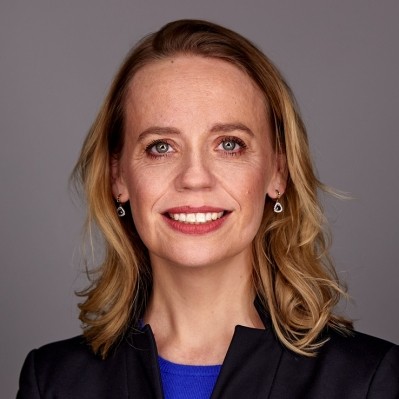Skretting's Julia Wolska kicks off our new series
The Female Vision: Women in Feed

Historically, the animal feed and pet food sectors—like many others—have seen a significant underrepresentation of women in leadership roles. Despite increasing awareness around diversity and inclusion, women continue to be underrepresented at the executive level and in key decision-making positions.
While hard data on gender diversity within these industries is scarce, anyone attending industry conferences and trade shows can attest to the male-centric landscape. Platforms like Women in Agribusiness have been created to foster female leadership, and this series will shine a spotlight on the women shaping the future of these sectors.
Kicking off our initiative is Julia Wolska, team lead for feed production at Skretting Aquaculture Innovation.
Career Path: Can you share your journey into the feed industry? What inspired you to pursue a career in this field, and what challenges did you face along the way?
Believe it or not, but as a little girl I never really imagined working in the feed industry, but I’ve always had a strong interest in food processing and technology. Growing up, I was curious about how food is made and the science behind it, which was definitely inspired by my parents, who both studied food related topics and worked in the food industry. So, it felt natural for me to study food technology as well.
After graduating, I moved to Stavanger with my husband and discovered that feed technology isn’t all that different from food technology. I applied for a job in the feed production department at Skretting and, 15 years later, I’m still here! Along the way, I’ve had the chance to complete an industrial PhD, work as a researcher, and eventually lead the feed production team.
What I love most about my job is the people. I’ve been lucky to work with colleagues from Skretting factories around the world, each bringing unique perspectives and ideas. It’s been incredibly rewarding to collaborate with such a diverse group of professionals.
The biggest challenge for me has been finding a good work-life balance. With global projects and different time zones, it’s easy to let work spill over into personal time.
Impact of gender: In your experience, how has being a woman influenced your career in the feed industry? Have you encountered any gender-specific challenges or opportunities?
I’ve tried not to focus too much on gender in my career, even though the feed industry, particularly in production, is male dominated. My approach has always been to do my job to the best of my ability and trust that my work would be judged on its quality, not on whether it was done by a man or a woman. I believe that mindset has paid off. I feel respected as both a colleague and a professional, and my opinions are valued. Skretting fosters an inclusive culture where people listen to one another, regardless of gender. That has been a huge advantage in my career.
The only gender-specific challenge I did face early on was the lack of female changing rooms in some feed production plants, including our pilot plant. I had to get creative when it came to finding a space to change into my work clothes! Thankfully, this is no longer an issue in any of our plants.
Mentorship and support: How important have mentorship and networking been in your career? Can you share any specific experiences where support from other women or mentors made a difference?
Throughout my career, mentorship and networking have played a crucial role in my growth, both professionally and personally. It has not only given me the tools to navigate my career but have also provided a supportive network of people who inspire and challenge me. Collaborating with people from various countries and cultures, especially within Skretting Aquaculture Innovation and Skretting factories worldwide, has been invaluable. Engaging with individuals who bring different perspectives and experiences has helped me broaden my understanding and improve my approach to work. It has also allowed me to learn more about how fish and shrimp feed is made, picking up tips and tricks that aren't written in any textbook.
One moment that I remember from early in my career was when my boss set up a meeting for me with Hilde Roald, who was then the production manager in Skretting Norway and is now our manufacturing director. She shared her experiences as a woman in feed production, which was incredibly encouraging and uplifting. Hearing her perspective reassured me that there is a path for women to succeed in this field.
Industry changes: What changes have you observed in the feed industry regarding gender diversity and inclusion over the years? What more needs to be done to improve representation and equity?
Over the years, I’ve seen significant changes in the feed industry regarding gender diversity and inclusion. When I first entered the field, it was male dominated, with few women in visible roles. However, there has been a growing awareness of the importance of diversity, and many companies are actively working to create a more inclusive environment. Initiatives aimed at promoting gender diversity in leadership positions have emerged, leading to a noticeable increase in female representation in various roles.
Despite these positive changes, there’s still more to be done to improve representation and equity. Many women in the industry still face challenges in being heard and valued in discussions and decision-making processes. Companies need to foster mentorship programs and support networks that encourage women to pursue leadership roles and navigate their careers effectively.
Moreover, it’s essential to address the workplace culture, ensuring it is supportive and free from bias. Training programs on unconscious bias and inclusive practices can help shift perspectives and create a more welcoming environment. By continuing to focus on these areas, the feed industry can enhance gender diversity and equity, benefiting the organization and the industry as a whole.
Advice for future generations: What advice would you give to young women aspiring to enter the feed industry? Are there specific skills or experiences you believe are essential?
For young women aspiring to enter the feed industry, my primary piece of advice is to believe in yourselves and your abilities. This field may still be male dominated, but your perspective and contributions are valuable. Always strive to do your best work, and take pride in what you accomplish, no matter how small it may seem.
It’s essential to be proactive in seeking opportunities to learn and grow. Engage in internships, workshops, or networking events that allow you to connect with industry professionals. Develop a solid understanding of both the technical and business aspects of the industry, as this well-rounded skill set will serve you well.
Remember, change starts with each of us. By breaking down biases and stereotypes, we pave the way for future generations. Treat yourself as an equal in every situation; self-confidence can inspire others and shift perceptions. Support fellow women in the industry and advocate for each other’s success.
Vision for the future: What is your vision for the role of women in the feed industry over the next decade? How can we work together to foster an environment that supports women’s growth and leadership?
My vision for the role of women in the feed industry over the next decade is one of increased representation and leadership at all levels. As the industry evolves, I hope to see more women stepping into key positions, driving innovation and change. By fostering an inclusive environment, we can encourage diverse perspectives that benefit everyone.
Collaboration is crucial women need to champion each other’s success and be each other’s allies. By treating ourselves and one another as equals, we can break down barriers and inspire future generations to thrive in this field. Together, we can create a culture that not only supports women but also enriches the entire feed industry.











